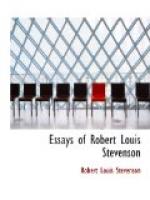And it is the great point of these imitations that there still shines beyond the student’s reach his inimitable model. Let him try as he please, he is still sure of failure; and it is a very old and a very true saying that failure is the only highroad to success. I must have had some disposition to learn; for I clear-sightedly condemned my own performances. I liked doing them indeed; but when they were done, I could see they were rubbish. In consequence, I very rarely showed them even to my friends; and such friends as I chose to be my confidants I must have chosen well, for they had the friendliness to be quite plain with me. “Padding,” said one. Another wrote: “I cannot understand why you do lyrics so badly.” No more could I! Thrice I put myself in the way of a more authoritative rebuff, by sending a paper to a magazine. These were returned; and I was not surprised nor even pained. If they had not been looked at, as (like all amateurs) I suspected was the case, there was no good in repeating the experiment; if they had been looked at—well, then I had not yet learned to write, and I must keep on learning and living. Lastly, I had a piece of good fortune which is the occasion of this paper, and by which I was able to see my literature in print, and to measure experimentally how far I stood from the favour of the public.
II
The Speculative Society is a body of some antiquity, and has counted among its members Scott, Brougham, Jeffrey, Horner, Benjamin Constant, Robert Emmet, and many a legal and local celebrity besides. By an accident, variously explained, it has its rooms in the very buildings of the University of Edinburgh: a hall, Turkey-carpeted, hung with pictures, looking, when lighted up at night with fire and candle, like some goodly dining-room; a passage-like library, walled with books in their wire cages; and a corridor with a fireplace, benches, a table, many prints of famous members, and a mural tablet to the virtues of a former secretary. Here a member can warm himself and loaf and read; here, in defiance of Senatus-consults, he can smoke. The Senatus looks askance at these privileges; looks even with a somewhat vinegar aspect on the whole society; which argues a lack of proportion in the learned mind, for the world, we may be sure, will prize far higher this haunt of dead lions than all the living dogs of the professorate.




